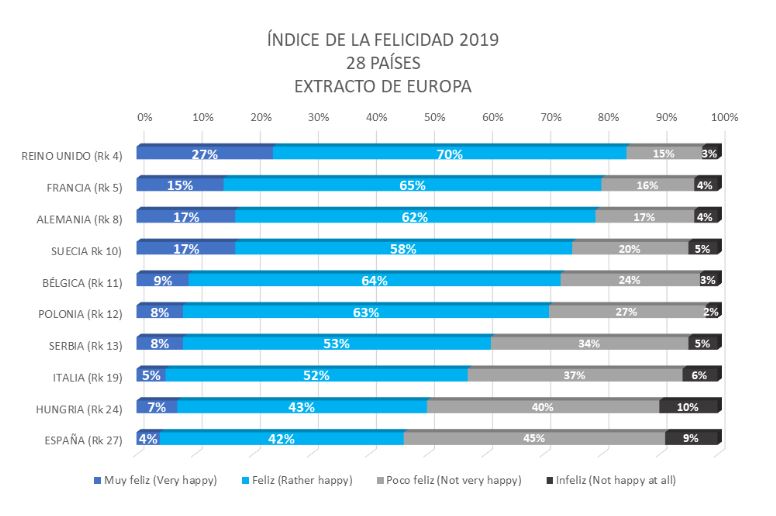
The Happiness Formula
What does happiness mean?
In what way do emotions affect the state of health of people? According to the Royal Spanish Academy, 'happiness' is defined as a "state of pleasant spiritual and physical satisfaction", a "person, situation, object or group of them which contribute to making people happy" or the " lack of inconveniences or difficulties".
What does happiness really mean?
Common definitions which in turn change according to the meaning which each one wants to give to his or her own search for happiness. In this regard, it is very difficult to give an overall definition of which actions, facts or situations convey a state of full emotional wellbeing among people.
Finding what makes us happy depends on the priorities and preferences that each person projects onto his or her life.
Happiness statistics
However, the latest data in the Ipsos Global Advisor on Global Happiness 2019 Report, which included 28 countries from all over the world, did not provide hopeful data for the current state of happiness of the Spanish people.
In terms of figures, the report showed that only about 46% of those asked in Spain said they were happy, which makes Spain the unhappiest country in Europe and the second poorest in the world, above Argentina.

Source: Global Happiness Study
Happiness hormones
However, finding a state of full happiness is expected to be a task for the Spanish population. Something that the so-called 'happiness hormones' have a lot to talk about. In fact, finding a balance between them is usually presented as a purpose necessary to bring about feelings of wellbeing and happiness on an every day basis.
An emotional state that, at the same time, provides health to the organism, generating positive effects on its functioning. In this way, finding out which emotions each one of them is related to and working on their stimulation are presented as necessary functions to reach that optimum and pleasant state of health:
Serotonin
This hormone is known as the 'Wellness Hormone', which is responsible for providing feelings of satisfaction, relaxation, well-being and increased self-esteem. Its production depends on a fundamental amino acid in nutrition called tryptophan, which is found in foods such as cereals, eggs, pasta, dairy products and rice, among others.
Endorphins
They are responsible for inhibiting the transmission of pain and stimulating the areas of the brain that produce pleasure. For this reason, it is important to consider that the dedication to some pleasant and/or fun activities helps to increase considerably the production of these hormones.
In this sense, it is recommended to achieve objectives, relax, laugh and keep a regular exercise routine, among others, in order to stimulate the production of endorphins.
Oxytocin
It is considered to be the hormone responsible for love and is mainly responsible for promoting self-confidence towards emotional bonds. It is recommended to spend time in meditation, exercise, physical contact and even crying to stimulate it and generate good levels of oxytocin, since this also relieves certain emotions.
Dopamine
It is one of the most well-known hormones of the nervous system, responsible for generating feelings of satisfaction and motivating the achievement of activities in a proactive way. It is recommended to spend time in physical exercise, meditate, listen to music and learn how to control emotions in order to stimulate the production of dopamine.
Health and Emotional Well-being
Within the context of a life full of health and emotional well-being, the Kingdom of Bhutan proposed to the United Nations just eight years ago a day in the year to celebrate the importance of being happy in life. Furthermore, that it would help people to find that optimum state of well-being and therefore to maintain good physical and mental health.

International Happiness Day.
The 20th of March is known as International Happiness Day. In fact, in order to reinforce this relationship between happiness and health, some studies have shown that the influence of emotional well-being on various aspects of physical health may be related, such as the one published three years ago in 'Applied Psychology: Health and Well-Being'.
In this way, it seems possible to find ways in which everyone may be able to find their full happiness if they take into account their everyday actions. The knowledge of how to adapt them to our routine and to learn to identify and manage what makes us really happy would help us to achieve a state of greater psychological well-being and health.
Tips to improve happiness
According to the experts, there are some ways in which we can achieve this state of greater psychological and physical well-being:
Keep a healthy diet.
People have heard the saying 'you are what you eat'. Cooking and enjoying healthy dishes contributes positively to the search for happiness and peace of mind. It is essential to include natural, chemical free foods in your daily routine to get a healthy and comfortable life.
In addition, in situations where an extra supply of minerals and vitamins is required, it is also recommended to supplement the daily diet with food supplements, which add that extra vitality to the body for situations of greater effort.
Exercise your mind and body.
Being active is also synonymous with happiness and well-being, not only for the brain but also for the body itself. Therefore, by looking for new motivations that keep us awake and active, we will be able to improve the health of our organism. Likewise, being motivated to practise sport and spending part of our daily routine on it also helps to improve and encourage our memory.
Have positive personal relationships.
Happiness helps to maintain a good balance of what we previously called the 'happiness hormones'. Learning to be with positive people and avoid negative relationships is important to ensure the health and wellbeing of your body.
Set your priorities in life.
The achievement of objectives keeps us always awake and active with regard to their development. In this way, it also helps to keep mind and body always in action. However, being able to find out what is really important to us, either at work or in our personal relationships, helps us to generate and feel positive emotions, which at the same time, help the health and psychological well-being of people.
Manage emotions.
Being wrong must never be understood as synonymous with failure. To learn from it and keep calm in situations of this kind is the most important thing if we want to learn how to live happily and avoid negative emotions. Achieving this level of emotional maturity will contribute to success in both personal and professional life.
Conclusions, balance your happiness and health.
In summary, achieving a balanced state where happiness and health both flow in the same direction, depends very much on the way you plan and search for that state of physical and emotional well-being. Giving priority to those daily actions that encourage the stimulation of the so-called 'happiness hormones' will contribute to feeling much healthier both inside and outside.
"Happiness begins when you love and care for yourself (inside), and that is in turn shown on the outside, bringing happiness to others".





